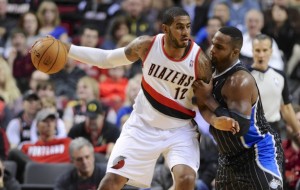In this week’s Around the Dorm, the “Ref,” Mike Herold, asks our panel three questions: whether the turnaround of the NBA’s Portland Trail Blazers or Phoenix Suns is more impressive and surprising, what people should be looking forward to in the 2014 Winter Olympics, and why there is disparity in different leagues of different sports.
1. The NBA’s Western Conference has two surprisingly strong teams. Are you more surprised by the success of Portland or Phoenix, and which team do you think will better sustain their success next year?

Chris: Both the Blazers and the Suns have been extremely impressive. Portland has gone from fringe playoff team to contender, while Phoenix has gone from tanking to playoff team. But in terms of which is more surprising and which will continue their success, the answer for both is the Blazers. The main reason being that it’s much harder to become a contender than it is to be a playoff team. Portland’s surge is thanks to two main factors: the evolution of Damian Lillard and the addition of Robin Lopez. Lillard is officially a stud, and that’s thanks to his improved three-point shooting. He’s been more efficient, making 44 percent of his threes, as opposed to 37 percent from last year. And if you’ve been living under a rock this season, you don’t know that Lillard has been clutch, making big shot after big shot. Lopez has been huge as well not just because of what he does, but what he allows LaMarcus Aldridge to do. Lopez is a hustle and defense player who can play center, allowing Aldridge to play his more natural position of power forward and have an All-Star campaign in the process. If they can get more help from the bench, most notably from C. J. McCollum, they could become the Western favorites.
Tom: Phoenix is hot right now. Even in January, the city is approaching temperatures from the mid to high ’70s. Playing in Phoenix is like dribbling across the blazing flames of our solar system’s sun. Perhaps that’s why they’re called the Suns? Who knows, the team has been very hush hush on the etymology. But for being so pale, point guard Goran Dragic is fast and avoids sunburn. He likely bathes in enough sunscreen to lubricate his layups up and down the court at breakneck speeds.
Peter: The Blazers’ success has been a pleasant surprise in Oregon, but with longtime All-Star quality power forward Lamarcus Aldridge coming back for another year with talented young players waiting in the wings, Portland looked like a playoff contender at the beginning of the year. The Blazers have not necessarily been a bad organization in recent years, and most of the playoff-less years have been a result of tough luck and injuries. With a healthy roster — especially Aldridge, Damian Lillard and Robin Lopez — Portland should continue this success for many years. The Phoenix Suns are more surprising, though, as they were never considered playoff contenders by anyone entering the season — ESPN’s pre-season power rankings put the Suns at 29th out of 30 teams, after the team had its worst-ever year — thanks to the Suns’ complete lack of known talent, which was not helped by Phoenix trading Marcin Gortat to indicate the team was tanking this year. Not only has Phoenix not tanked, it has played through a rash of injuries and someone solidified itself as a top-8 team in the hyper-competitive West.
Pete wins for distinguishing between the surprise factor and sustainability, Chris gets 2 points for his analysis of Damian Lillard, and Tom gets 1 because Phoenix is indeed hot.

2. The Winter Olympics are right around the corner. Which event should sports fans be looking forward to the most in the Games?
Chris: There are plenty of sports that we only get to see in the Winter Olympics, but the majority of them are individual sports. That’s why people should be watching hockey during these Olympics. First off, the Winter Olympics is basically as close to a World Cup that hockey is going to get. All nations are fighting against each other for the gold, making it an exciting tournament, the likes of which we see only once every four years. Secondly, it enables us to see different combinations of players playing with each other. For Canada, we get to see the likes of Rick Nash, Sidney Crosby, John Tavares and Steven Stamkos on the same squad. Finally, it’s all about national pride. It gives us Americans a chance to root for our team to be superior than all other countries. USA! USA! USA!
Tom: Figure skating is great. Be on the lookout for Vladimir Putin skating around the issue of his flagrant homophobia. He’s scheduled to compete in the single men’s mens’ singles. Regarding his tight and glittery double-stretch lycra costume and open-axel technique, Putin was quoted as saying, “It’s not what it looks like.” Four out of 10 in form, 10 out of 10 in bigotry.
Peter: While there is something to be said for watching Winter Olympics-specific sports like curling and the Luge, nothing is as exciting this time of year as watching international hockey on one of sports’ biggest stages. The bitter rivalries between hockey-obsessed countries like Canada and Russia are a gripping storyline every four years, and the history between the great countries of the sport — which includes the U.S., although the roster is a distant third in on-paper talent — means it will be easy to care about what transpires on the ice, even for non-hockey fans. After the Gold medal game in 2010, for example, a potential U.S.-Canada rematch would be thrilling, and the trend of North American teams failing on foreign soil in the Winter Olympics would make a victory for one of those two teams all the sweeter. There a couple of curve balls this time around that make the tournament even more interesting, though, including the large 200 x 98.5 foot rinks that will favor European teams and Russia’s home field advantage. Olympic hockey is always highly entertaining, and back in a hockey country for a tournament that promises to live up to the high standards set four years ago in Vancouver.
Chris wins for mentioning chants of USA!, Pete gets 2 for giving a similar analysis of hockey’s appeal during the Olympics, and Tom gets 1 because in Russia, Putin skates on you.
3. In both the NBA and NHL, the Western Conference seems dominant. Similarly, in the NFL and MLB, the AFC and AL typically have better teams overall. Is there a reason for this, or is it just happenstance that the West/American conferences are better than the East/National ones?
Chris: First off, this question isn’t entirely true. The NFC is better than the AFC. Past the obvious contenders of the Broncos, Patriots and Colts, there are several good-but-not-great teams. Cincinnati was awful in the playoffs. Kansas City still has a bit of a ceiling on their team. And Miami, Baltimore, San Diego, New York and Pittsburgh are all still up-and-down teams. Meanwhile, the NFC has New Orleans, Carolina, San Francisco, Green Bay and Seattle as contenders, while the Eagles, Cowboys, Bears, Lions and Cardinals are all respectable teams. There’s no rhyme or reason for this, however, because strength of conference changes from generation to generation. For example (on a smaller scale), the NFC East used to be a dominant conference. Now, they’re the laughing stock of the NFL, with the Eagles being the only good team. The West has been very good for quite a while in the NBA, and but the conferences are a little more even in the NHL and MLB. This shows that a changing of the guard could be happening. Sports leagues’ success will shift with the trading and signing of marquee players, which happens every year.
Tom: The last time a team in the AL West took the World Series was Oakland in 1989. The last time a team in the AFC West won the Super Bowl was Denver in 1999. Just because America won the West in the 1800s doesn’t mean the West will win today. Just ask Arizona senator and ex-presidential candidate John McCain, who was traded by the Republican Party to play tight end for the 4-12 Oakland Raiders. He’s since been put on injured reserve for a broken dream.
Peter: Some Western teams do have a (small) advantage in where they play. Teams located in Colorado, for example, practice and play at a higher altitude, which helps prepare them for games and creates a better home-field advantage. In general, though, I think any discrepencies between conferences is arbitrary and temporary. From 1969-1981, 11 of 13 NFL champions came out of the AFC, but from 1982-1997 the Super Bowl winners were from the NFC 15 of 16 times. Eventually, the tides will turn in the NBA and NHL as well — it’s virtually random.
Tom wins for focusing on more than football, Peter gets 2 for pointing out geographical advantages, and Chris gets 1 for debating the respectability of the NFC.






